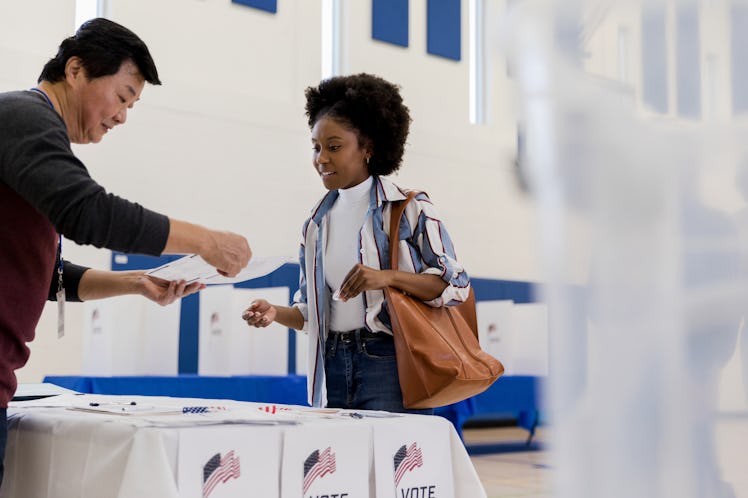
If Your ID Is Expired On Election Day, Don't Panic — Here's What To Do
There are a couple of options.
By the time you’re reading this, you’ve probably been told by no less than five people to make a plan to vote in the 2022 midterm elections. It’s good advice, but you might run into some roadblocks as you get your strategy together. If one of those issues is an expired ID, you’re probably wondering if you can vote if your ID is expired. Well, it varies, but here’s what you should know.
If your state requires an ID to vote, but yours is expired, your first step is to check your local state laws around casting your vote. Some states with ID requirements, like Georgia, allow voters to use certain forms of ID, even if they’re expired. But other states, like Texas or Alabama, require an ID that’s currently valid or has only been expired for less than a certain timeframe. You can check your state’s ID requirements to vote at vote411.org. If you can’t use your expired ID, it’s important to make sure you have a back-up option for identification: According to the National Conference of State Legislatures (NCSL), you can use a driver’s license, state-issued ID card, passport, military ID, or tribal ID to vote in most states.
As of October 2022, there are 18 states that ask voters for a photo ID, including Arkansas, Georgia, Indiana, Kansas, Mississippi, Missouri, Tennessee, Wisconsin. Another 17, including Arizona, North Dakota, Ohio, and Wyoming, also accept non-photo IDs, like Medicare and Medicaid identification cards.
Beyond IDs, some states allow voters to use forms of identification without photos, such as a bank statement with your name and address, a valid voter registration certificate, a birth certificate, and more. Those states include: Florida, Idaho, Louisiana, Michigan, Montana, South Dakota, Texas, Rhode Island, Alaska, Colorado, Connecticut, Delaware, Hawaii, Iowa, Kentucky, New Hampshire, Pennsylvania, Utah, Virginia, Washington, Oklahoma, North Carolina, and West Virginia. While South Carolina does indeed have a photo ID requirement, that requirement is waived when a registered voter has a “reasonable impediment to obtaining a photo ID,” according to the NCSL.
Of course, you may not need an ID at all — in which case, you don’t have to worry about expiration dates! Washington, D.C. and 15 other states all use other secure methods to verify the identity of their voters on Election Day. It’s worth noting, however, that the rules are sometimes different if you’re a first-time voter, so it’s best to be prepared. You can check Vote.org’s state by state guide to see your state’s requirements.
But if anything goes wrong, don’t panic, because you might be able to fill out a provisional ballot. According to fact-checking site Snopes, federal law requires election officials to provide "ineligible voters" with provisional ballots, in accordance with Section 302 of the Help America Vote Act (HAVA). As a heads-up, you should know they aren't exactly cast the same as a standard ballot: These ballots are held separately from the others until after the election so they can be checked for eligibility. Some states don’t require any further action from you after you cast your provisional ballot, but laws in some stricter states may have you return to your local election office a few days after the election so you can show them an acceptable form of ID in order to get your ballot counted. In either case, make sure you know your state’s requirements so you can resolve any problems that come up — and make sure to keep up with your ID renewal from here on out!
This article was originally published on